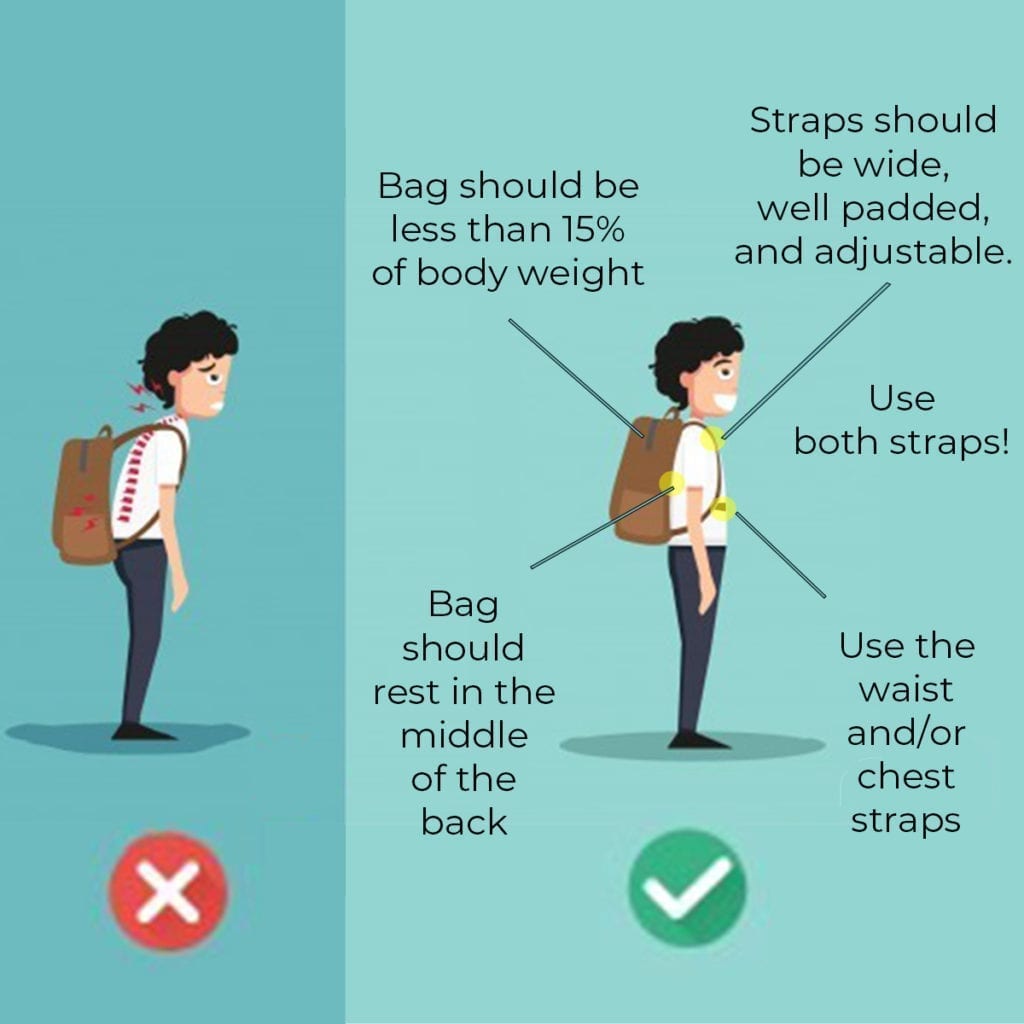What’s in Your Bag?
-Stuti Punshi

The Postural Problems Hidden in Plain Sight
Whether it’s a handbag, school backpack, work tote, or gym duffel, most of us carry a bag every day without thinking twice about it. But what if we told you that the way you carry your bag—and what you put in it—could be affecting your posture, causing pain, and even leading to long-term musculoskeletal issues?
As physiotherapists, we regularly see patients with neck pain, backaches, shoulder tension, and even headaches—all linked to poor bag-carrying habits. Let’s unpack what’s really in your bag—and what it might be doing to your body.
The Deeper Impact: How Poor Bag Habits Can Lead to Long-Term Conditions
You may not feel the effects of poor bag-carrying habits immediately, but over time, these subtle imbalances can compound into significant musculoskeletal issues. Physiotherapists frequently see conditions such as:
Chronic Neck and Back Pain
Regularly carrying an uneven or overloaded bag shifts your center of gravity and causes muscular overcompensation. This leads to:
-
Persistent upper or lower back pain
-
Neck stiffness and reduced range of motion
-
Referred pain into the shoulders, arms, or even the jaw (due to tension and nerve compression)
Postural Abnormalities: Kyphosis & Scoliosis
-
Over time, poor load distribution can exacerbate spinal asymmetries.
-
Functional scoliosis (a reversible, posture-related curvature) may develop from consistently carrying a bag on one side.
-
Overloaded backpacks or slouched posture can reinforce thoracic kyphosis (rounded upper back), especially in adolescents or those with weak postural muscles.
Thoracic Outlet Syndrome (TOS)
TOS is a condition where nerves or blood vessels in the thoracic outlet (between the collarbone and first rib) become compressed. This often results from:
-
Tight scalene or pectoral muscles
-
Elevated shoulders from poor bag habits
-
Forward head posture and scapular dysfunction
Common symptoms include:
-
Numbness, tingling, or weakness in the arms and hands
-
A feeling of heaviness or fatigue in the upper limb
-
Pain in the neck, shoulder, or chest region
In many cases, physiotherapy can help manage and reverse early signs through manual therapy, postural retraining, and strengthening programs—but prevention is key.
🔍 Physiotherapist Insight
“We often see young adults, professionals, and students with postural adaptations due to everyday habits. A seemingly harmless shoulder bag or overloaded backpack can start a cascade of muscular strain and alignment issues. Early awareness and proper carrying strategies can make a huge difference in preventing chronic conditions.”
— Complete Care Physiotherapy Team
How Bags Affect Your Body: A Physiotherapy Perspective
Common Causes of Postural Pain from Bags:
-
Asymmetrical Loading: Carrying weight on one side of the body creates muscular imbalances.
-
Forward Head Posture: Frequently seen when leaning forward due to poor bag positioning.
-
Overloaded Bags: Exceeding the ideal weight (10–15% of body weight) places stress on joints and muscles.
-
Repetitive Strain: Daily use leads to cumulative wear on the spine, shoulders, and neck.
-
Incorrect Strap Positioning: Poor strap design or placement contributes to pressure points and altered posture.
Shoulder Bags: A Lopsided Load
Carrying a heavy bag on one shoulder (like a tote, briefcase, or messenger bag) may seem convenient, but it forces your body to compensate in subtle but harmful ways:
-
Elevated Shoulder: Your shoulder lifts to stop the strap from sliding off.
-
Spinal Tilt: The spine bends or twists to balance the weight.
-
Muscle Strain: One side overworks, while the other becomes weaker and underused.
-
Forward Head and Rounded Shoulders: These changes shift the body’s center of gravity forward.
Over Time, You Might Develop:
-
Chronic neck and upper back pain
-
Shoulder impingement
-
Thoracic outlet syndrome
-
Headaches due to muscle tension
-
Altered scapular (shoulder blade) mechanics
Backpacks: Better, But Not Always Right

Backpacks distribute weight more evenly if worn properly. However, these common mistakes undo the benefits:
-
Only using one shoulder strap
-
Wearing the backpack too low
-
Carrying excessive or unbalanced weight
-
Loose, thin, or unpadded straps
Consequences Include:
-
Slouched posture with rounded shoulders
-
Neck and mid-back tension
-
Lower back pain from lumbar strain
-
Altered walking pattern due to imbalance
Is Your Bag Affecting You? Watch for These Red Flags:
-
One shoulder feels sore or appears higher
-
Red marks, pressure points, or numbness in arms
-
Frequent neck stiffness or tension headaches
-
Postural changes: leaning forward, arching lower back, or lateral tilt
-
Difficulty standing or walking upright after prolonged carrying
Physiotherapy-Backed Tips for Carrying Smarter

For Shoulder Bags:
-
❖ Switch sides regularly to prevent dominance on one side.
-
❖ Opt for crossbody styles that distribute weight more evenly.
-
❖ Lighten your load – remove items you don’t need daily.
-
❖ Choose wide, padded straps for better comfort.
For Backpacks:
-
❖ Always use both shoulder straps.
-
❖ Adjust the fit so the backpack sits snug and high on the back.
-
❖ Use chest and waist straps to help distribute weight.
-
❖ Pack heavier items closest to your spine to preserve posture.
-
❖ Keep the bag’s weight under 10–15% of your body weight.
👪 Parents: Check your child’s bag regularly. Back pain is increasingly common in children and teens due to overloaded school bags and improper carrying habits.
Preventive Measures & Strengthening Tips
Even with perfect technique, a sedentary lifestyle or muscle weakness can contribute to pain. Here’s how to stay strong and resilient:
Postural Awareness & Core Stability:
-
Practice standing tall: ears aligned over shoulders, shoulders over hips.
-
Strengthen core and postural muscles (e.g., planks, bridges, rows).
-
Stretch tight muscles like the pectorals, upper traps, and hip flexors.
-
Incorporate dynamic mobility exercises to offset sedentary periods.
Daily Habits to Improve Posture:
-
Alternate which hand or shoulder you use for carrying.
-
Perform micro-breaks throughout the day to reset posture.
-
Maintain good ergonomics when sitting or working at a desk.
When to See a Physiotherapist
If you’re experiencing any of the signs mentioned, don’t wait for it to become a chronic issue. Physiotherapy can help you:
✔ Diagnose the root cause of pain or dysfunction
✔ Assess muscle imbalances and joint mechanics
✔ Prescribe corrective exercises to restore balance and strength
✔ Advise on personalized bag usage and workplace ergonomics
✔ Prevent long-term postural degeneration
Final Thoughts: Carry Smarter, Move Better
So… what’s in your bag? Beyond the books, bottles, and devices, there could be strain, tension, and long-term postural problems. The good news? A few small changes in how you carry your bag can make a big difference in how your body feels.
🎒 If you’re experiencing aches, stiffness, or want a professional opinion, we’re here to help. At Complete Care Physiotherapy, we offer personalized postural assessments and evidence-based treatment plans to help you move pain-free and confidently.
📞 Call: 647-496-7065
📧 Email: completecarels@gmail.com
🌐 Visit: www.completeccare.ca



